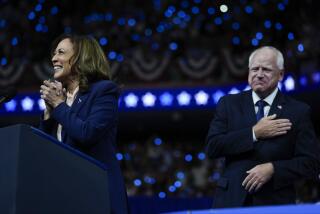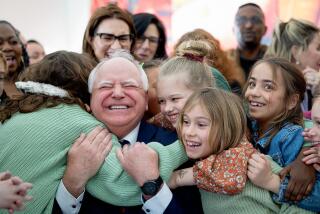In Veepstakes, Candidates Look for Partners Who Are Already Winners
- Share via
Loyalty. Personal compatibility. The ability to step in as president.
Those are some of the high-minded considerations George W. Bush and Al Gore are weighing as they ponder their choices for vice president.
But let’s assume, just for a moment, that Bush and Gore also want to select someone who might help them win in November. How might the list look then?
In both parties, political professionals now sort potential veeps into two basic categories. In one group are geographic picks meant to help carry a particular state. In the other are “message” picks meant to send a political signal across the country. There’s no guarantee a pick from either column will have the desired effect. On the other hand, an inspired choice can sometimes do both--in 1992, Gore reinforced Bill Clinton’s message of centrist generational change and also helped nudge Tennessee into the Democratic column.
By common consent, Republican Bush began the process with better options in both categories. But circumstances and internal GOP politics have weakened his hand.
In the message category, the Republicans have the only two names that could reshape the playing field overnight. But former Joint Chiefs of Staff Chairman Colin L. Powell has categorically ruled out running, and Sen. John McCain of Arizona has been only slightly less definitive in sidelining himself. McCain offers enormous appeal to independents. But Bush, who shares the family obsession with loyalty, is likely to resist begging a rival who’s so notably kept his distance. Elizabeth Hanford Dole is a big name too, but the dubious prospect of starting a new century with a Bush-Dole ticket has kept her grounded.
If Bush can’t have a superstar, what other messages could he try to send with his choice? Those around him believe he’d like to signal his commitment to diversity, but there’s no obvious woman or minority available to pick. Alternately, since the biggest questions Bush faces are whether he has the experience and heft to handle the presidency (especially in foreign policy), some Republicans are attracted to reassuring “wise man” types like Sen. Richard G. Lugar of Indiana or former Defense Secretary Richard B. Cheney, who’s leading the vice presidential search process. But although Bush has pointedly refused to rule out Cheney, neither he nor Lugar is likely to set off many sparks with voters. Either would be a defensive pick.
Bush might get a bigger electoral bang by reaching out to the McCain coalition. Two prominent McCain supporters look to still be in the mix. Sen. Fred Thompson of Tennessee brings star-power charisma and the alluring possibility of pressing Gore in his home state, but also a flamboyant bachelor’s life that’s landed him in the tabloids. Less flashy but also intriguing is Sen. Charles Hagel of Nebraska. Hagel is sufficiently conservative that he wouldn’t offend the GOP base but independent enough (he’s a regular critic of Senate Majority Leader Trent Lott) to signal that Bush intends to maintain his own independence from the party’s controversial congressional leadership. The downside: With only four years in elected office, Hagel might underscore Bush’s own relative lack of experience.
Bush’s geographic list has one viable name on it: Pennsylvania Gov. Thomas J. Ridge. If Bush could win Pennsylvania, he would make it extremely tough for Gore to reach an electoral college majority. And in a close race, Bush may need help to carry the state--the Democratic presidential nominee has run at or above his national share of the vote there in each of the last 12 elections. Even so, all the vibrations from Austin, Texas, are that the Bush campaign is worried that Ridge, who supports abortion rights, might generate conservative unrest that could hurt the ticket elsewhere. If that calculation shelves Ridge, Democrats will breathe a sigh of relief.
Given the inevitable defects in all his options, Bush might choose from neither column A nor column B and instead make a pick with the aim of only doing no harm. Names on that list include Oklahoma Gov. Frank Keating and Sen. Bill Frist of Tennessee--attractive, smart pols who don’t send a particularly vivid message or carry much geographic weight. (Oklahoma is reliably Republican, and Frist probably isn’t strong enough to put Tennessee truly in play.) If the race tightens this fall, Bush might regret such an excess of caution.
Democrats are mulling plenty of names too. But even fewer offer real electoral juice.
The hottest prospect in Democratic circles last week was House Minority Leader Richard A. Gephardt. On paper, Gephardt offers both message (reassuring the base; energizing organized labor), and geography (he’s from Missouri, a key swing state). But Gore-Gephardt would be a Washington-heavy ticket; besides, those around him believe Gephardt, the captain of the Democratic attempt to retake the House, would be extremely reluctant to abandon the quest.
If Gephardt stays put, Gore’s message choices are bleak. Former Sen. George J. Mitchell offers experience and competence, but those aren’t Gore’s problems with voters. (Strength and leadership are.) Sen. Evan Bayh of Indiana, a young centrist, might do for Gore what Gore did for Clinton: reinforce his message. But Bayh’s state is presumably out of reach for the Democratic ticket and, like Gore, he’s a senator’s son; that’s a lot of privilege for one ticket to carry. Defense Secretary William S. Cohen (a Republican) is intriguing but unlikely to dent Bush’s hold on moderate GOP voters. And former Treasury Secretary Robert E. Rubin has never run for office; the vice presidency would be a tough place to start.
Geographic picks look more fruitful. Lots of Democrats like Sen. Richard Durbin of Illinois. But if Gore can’t win Illinois by himself, he’s already lost. Conversely, North Carolina may be too difficult even with Gov. James B. Hunt Jr. or Sen. John Edwards on the ticket. That could leave Sen. Bob Graham of Florida in the Goldilocks position: A popular figure in a state that’s difficult, but within reach, for Democrats, he could be just right. Indeed, from an electoral standpoint, no one may offer Gore nearly as much as Graham.
Finally, there’s Sen. John F. Kerry of Massachusetts, in many ways the Democratic Keating: a talented pol who doesn’t offer either a swing state or a clear message. Kerry could effectively carry the Democratic case. But given Bush’s current lead in the polls, Gore’s choice may need to bring more to the table than that.
*
See current and past Brownstein columns on The Times’ Web site at: https://www.latimes.com/brownstein.
More to Read
Get the L.A. Times Politics newsletter
Deeply reported insights into legislation, politics and policy from Sacramento, Washington and beyond. In your inbox twice per week.
You may occasionally receive promotional content from the Los Angeles Times.










